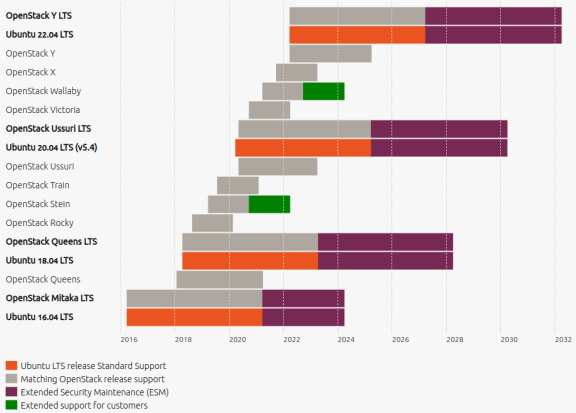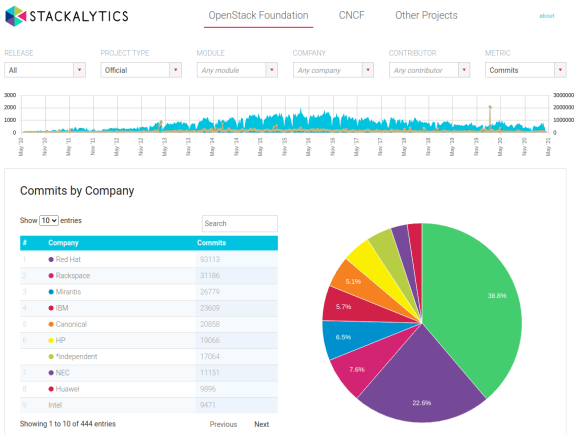OpenStack CentOS alternatives:
7 reasons to migrate to UbuntuTytus Kurek
on 26 April 2021
Tags: centos , Migration , OpenStack , Private cloud , Ubuntu
Looking for OpenStack CentOS alternatives after recent changes in the CentOS project?
Think Ubuntu – the most popular Linux distribution for OpenStack deployments across development and production environments.
Wondering what makes Ubuntu different? Here are seven reasons you should consider Ubuntu when planning your CentOS migration.
Ubuntu is the leading operating system for OpenStack deployments
According to the OpenStack User Survey from 2020, Ubuntu is the most popular operating system (OS) for OpenStack deployments. Ubuntu Server powers 40% of OpenStack clouds all over the world. So if you are looking for an alternative to CentOS, Ubuntu is the most straightforward choice. Ubuntu has been chosen as a platform for OpenStack deployments by leading companies in the telco, finance, hardware manufacturing, retail, automotive and healthcare sectors. Those include AT&T, BNP Paribas, Cisco, BestBuy, Daimler and Spectrum Health.

No mandatory subscriptions
OpenStack on Ubuntu is freely available to download and use. No mandatory subscriptions or licensing fees are required to use OpenStack on Ubuntu. Each Ubuntu instance comes the same, whether an optional, Ubuntu Advantage for Infrastructure (UA-I) subscription is attached or not. As a result, users benefit from a consistent experience across both development and production environments. They can also decide which environments to cover under UA-I and which not. UA-I is a per-machine subscription that can be added onto any estate to provide access to additional enterprise support and security services by Canonical.
Available with enterprise support
For enterprise customers, Canonical provides production-grade commercial support for their OpenStack installations on Ubuntu. Three levels of support are available: from security updates only through phone and ticket support to fully managed services. The most comprehensive offering includes cloud monitoring and maintenance, incident and problem resolution, software updates, OpenStack upgrades and production-grade service level agreements (SLAs). Support is charged per node for cost transparency, enabling predictable budgeting for organisations.
Stable, secure, compliant, hardened
OpenStack on Ubuntu comes with a predictable release cadence and upgrade path. When deployed on Ubuntu Long Term Support (LTS), users can benefit from five years of software and security updates for free. Additional advantages, such as Extended Security Maintenance (ESM), compliance and hardening programmes are available under the UA-I subscription. According to various independent rankings, Ubuntu is the most secure enterprise Linux distribution, providing security out of the box and security by the process.

Every OpenStack version supported
Each upstream OpenStack version comes with new features and bug fixes that expand OpenStack capabilities and improve its quality. Canonical recognises that and provides full support for every version of OpenStack on Ubuntu within two weeks of the upstream release. This enables users to get immediate access to the latest updates for their environments and stay in sync with upstream. Once a particular OpenStack version reaches its end of life (EOL) state, users can easily upgrade to a newer version.
Long-term community member
Canonical has been involved in OpenStack development since the early beginnings of the project. Together with other leaders, we have been driving the evolution of OpenStack over years, focusing on improving its stability and providing an automation framework for its installation and operations. Canonical is also one of the top all time contributors to OpenStack. As a result, we know OpenStack very well and are able to constantly ensure that the OpenStack on Ubuntu provides a first-class experience.

Straightforward installation methods
You can install OpenStack on Ubuntu via regular deb packages available in the official Ubuntu Archive. As a result, it seamlessly plugs into the existing Ubuntu ecosystem. In addition, you can leverage various official projects, including OpenStack Charms and OpenStack Ansible which enable fully automated OpenStack installation and operations on Ubuntu.
Refer to the official installation instructions on the Ubuntu website for more information on how to set up a production-grade OpenStack cluster.
Or try MicroStack – a pure upstream OpenStack distribution, designed for small-scale and edge deployments that you can install with minimal effort. Even on your workstation!
OpenStack CentOS – next steps
Now that you know the benefits of running OpenStack on Ubuntu, you can plan your migration with confidence. Use the following resources to get more information on the next steps:
- Read more about OpenStack on Ubuntu by visiting our website
- Join our webinar on May, 26th to learn about the migration process
- Watch our on-demand Q&A session about the next steps for CentOS users
- Get in touch with Canonical for support with your migration plans
Wherever you go from here, stay focused on OpenStack!
Smart operations, optimal architecture, better pricing.
OpenStack and Ubuntu bring automated deployment and management that help you optimise infrastructure costs — no matter your industry or use case.
Newsletter signup
Related posts
6 facts for CentOS users who are holding on
Considering migrating to Ubuntu from other Linux platforms, such as CentOS? Find six useful facts to get started!
Why is Ubuntu Linux the leading choice to replace CentOS for financial services?
Financial services are powered by technology. The customer experience is increasingly driven by data, with tailoring of products and services to reflect...
SONiC: The open source network operating system for modern data centers
Software for Open Networking in the Cloud (SONiC) is an open-source network operating system that has revolutionized data center networking. Originating as a...
